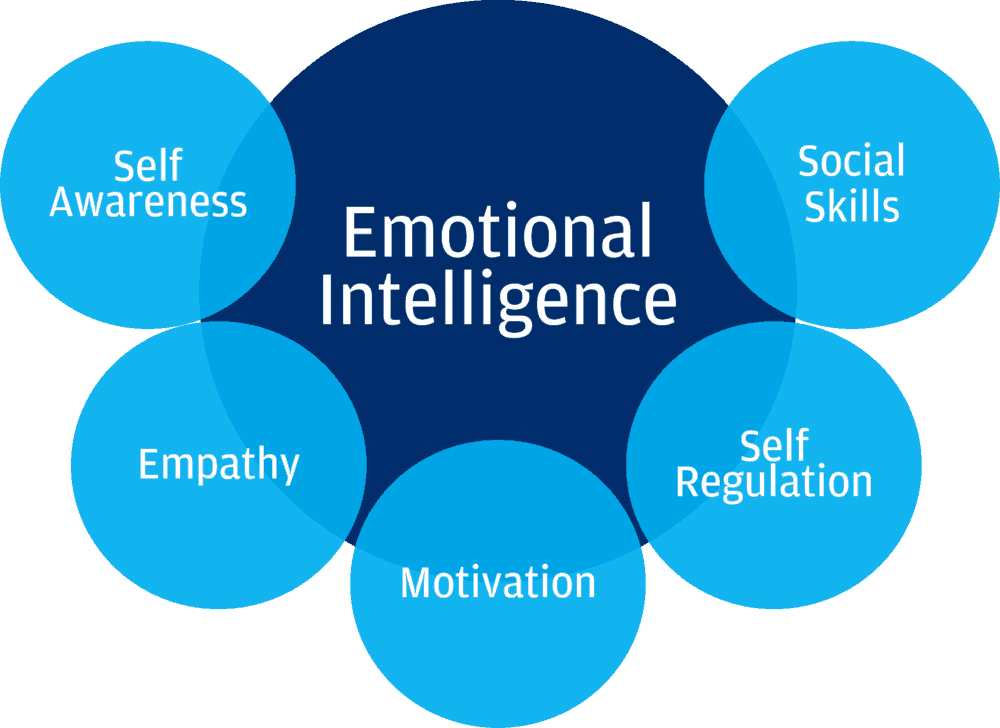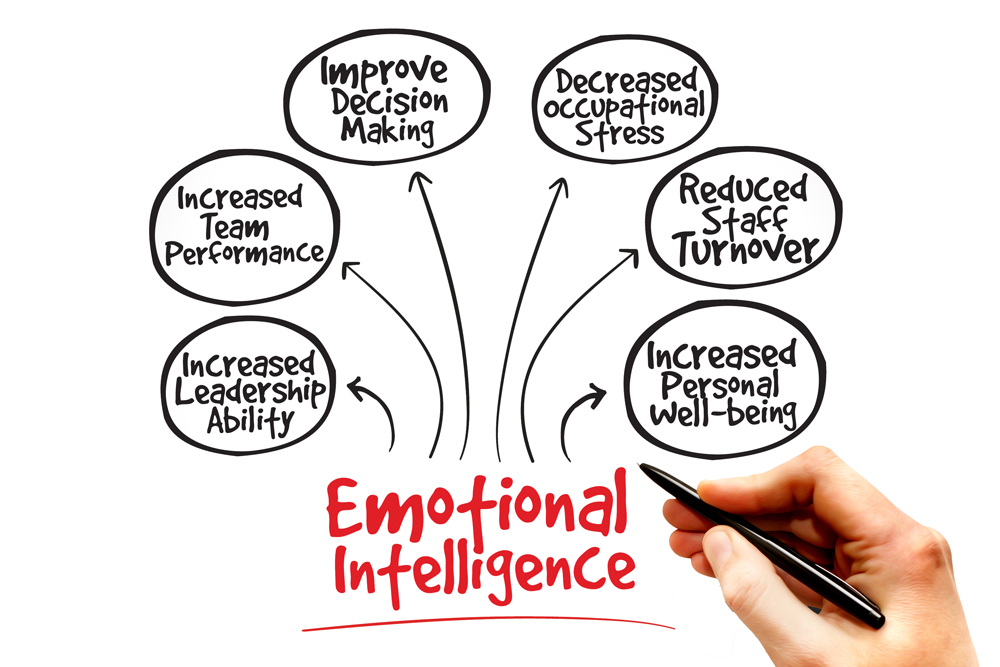1) What is emotional intelligence?
Emotional intelligence (EI) refers to the ability to recognize, understand, manage, and effectively use one’s own emotions, as well as the ability to recognize, understand, and influence the emotions of others. It encompasses a range of skills and attributes that contribute to self-awareness, self-regulation, social awareness, and relationship management. Here are the key components of emotional intelligence:

Self-Awareness: The ability to recognize and understand one’s own emotions, strengths, weaknesses, values, and motives. Self-aware individuals are more likely to understand how their feelings affect them and their performance.
Self-Regulation: The ability to manage and control one’s own emotions, particularly in stressful situations, and to maintain composure and think clearly. This involves being able to delay gratification and control impulses, maintaining standards of honesty and integrity, and being flexible in adapting to changing circumstances.
Motivation: A passion for work that goes beyond money or status, characterized by a drive to pursue goals with energy and persistence. Motivated individuals often have a strong desire to achieve and are optimistic even in the face of failure.
Empathy: The ability to understand and share the feelings of others. Empathy involves recognizing others’ emotional states and responding appropriately, which is crucial for building and maintaining healthy relationships.
Social Skills: Proficiency in managing relationships and building networks. This includes abilities such as effective communication, conflict management, leadership, influence, collaboration, and teamwork.
2) Which are the situations where emotional intelligence helps the concerned person?
Emotional intelligence (EI) plays a crucial role in various aspects of life, benefiting individuals in numerous situations. Here are some key scenarios where EI can be particularly helpful:

1. Workplace Interactions
Leadership and Management: Leaders with high EI can inspire and motivate their teams, manage stress, and handle conflicts effectively. They are also better at empathizing with employees’ concerns and needs.
Team Collaboration: EI helps in understanding and managing team dynamics, fostering a cooperative and harmonious work environment.
Conflict Resolution: Those with high EI can navigate disputes calmly and constructively, finding mutually beneficial solutions.
2. Personal Relationships
Communication: EI enhances the ability to communicate thoughts and feelings clearly and empathetically, leading to healthier and more fulfilling relationships.
Conflict Management: High EI individuals can manage disagreements and conflicts in personal relationships without escalating tensions.
Empathy and Understanding: Being able to empathize with others’ emotions helps in building deeper connections and understanding within relationships.
3. Stress Management
Coping Mechanisms: People with high EI can recognize and manage their own emotions effectively, reducing the impact of stress and preventing burnout.
Resilience: EI contributes to resilience, allowing individuals to bounce back from setbacks and maintain a positive outlook.
4. Decision Making
Balanced Decision Making: EI enables individuals to balance emotions with logic, leading to more well-rounded and thoughtful decisions.
Awareness of Emotional Impact: Understanding the emotional consequences of decisions on oneself and others can lead to more ethical and empathetic choices.
5. Social Situations
Building Relationships: High EI helps in making and maintaining social connections by understanding social cues and responding appropriately.
Navigating Social Complexities: EI aids in managing social complexities and dynamics, such as dealing with difficult personalities or understanding group hierarchies.
6. Educational Settings
Student-Teacher Interactions: Teachers with high EI can better understand and respond to students’ emotional needs, creating a supportive learning environment.
Peer Relationships: Students with high EI are better at forming and maintaining positive peer relationships, contributing to a more inclusive and supportive school environment.
7. Healthcare
Patient Care: Healthcare providers with high EI can offer more compassionate and effective care by understanding and addressing patients’ emotional and psychological needs.
Teamwork among Healthcare Professionals: EI facilitates better communication and collaboration among healthcare teams, improving overall patient care quality.
8. Negotiations
Understanding Opponents: In negotiation settings, high EI helps in understanding the emotions and motivations of the other parties, leading to more successful outcomes.
Maintaining Composure: Managing one’s emotions during negotiations can prevent escalation and facilitate smoother negotiations.
3) How to develop emotional intelligence?
Developing emotional intelligence (EI) involves enhancing your ability to recognize, understand, and manage your own emotions, as well as recognizing, understanding, and influencing the emotions of others. Here are some practical steps to develop emotional intelligence:

1. Self-Awareness
Mindfulness Practices: Engage in mindfulness or meditation to become more aware of your emotional states.
Reflective Journaling: Write about your feelings and thoughts regularly to understand your emotional patterns.
Feedback Seeking: Ask for feedback from trusted friends or colleagues about how you come across emotionally.
2. Self-Regulation
Stress Management: Practice techniques such as deep breathing, progressive muscle relaxation, or yoga to manage stress.
Impulse Control: Pause and think before reacting to emotional triggers. Count to ten or take a short walk if necessary.
Adaptability: Work on being flexible and open to change, which helps in managing unexpected emotional responses.
3. Motivation
Set Personal Goals: Create clear, achievable goals that align with your values and passions.
Positive Thinking: Cultivate an optimistic outlook by focusing on the positives and learning from failures.
Self-Improvement: Regularly seek opportunities for personal growth and learning.
4. Empathy
Active Listening: Pay close attention to what others are saying without interrupting, and show that you understand by paraphrasing or summarizing their points.
Perspective-Taking: Try to see situations from others’ perspectives to better understand their emotions and viewpoints.
Emotional Support: Offer help and support to others when they are in need, showing genuine concern for their well-being.
5. Social Skills
Effective Communication: Work on clear and assertive communication, expressing your feelings and needs respectfully.
Conflict Resolution: Develop skills to handle conflicts constructively, focusing on finding mutually beneficial solutions.
Relationship Building: Invest time in building and maintaining strong, positive relationships with others.
6. Continual Learning and Practice
EI Training Programs: Participate in workshops or courses focused on emotional intelligence development.
Reading and Research: Read books and articles on emotional intelligence to deepen your understanding and discover new techniques.
Practice: Regularly apply these skills in your daily interactions and reflect on your experiences to continually improve.
Recommended Resources
Books: “Emotional Intelligence” by Daniel Goleman, “The Emotional Intelligence Quick Book” by Travis Bradberry and Jean Greaves.
Courses: Online platforms like Coursera or Udemy offer courses on emotional intelligence.
Apps: Apps like Headspace for mindfulness, and journaling apps like Day One to track your emotional progress.
Developing emotional intelligence is a continuous journey that requires commitment and practice. By integrating these strategies into your daily life, you can enhance your emotional awareness, regulation, and interpersonal skills.
4) In what way emotional intelligent person is different from the qualities of those the Pragya Purush as described in the Bhagwat Gita?
Emotional intelligence (EI) and the qualities of a Pragya Purush (a wise person) as described in the Bhagavad Gita share some similarities but also have distinct differences. Here is a comparative analysis of both concepts:

Emotional Intelligence
Emotional intelligence, as popularized by Daniel Goleman, involves the following core components:
Self-awareness: Recognizing one’s own emotions and their effects.
Self-regulation: Managing one’s emotions in healthy ways.
Motivation: Being driven to achieve for the sake of achievement.
Empathy: Recognizing, understanding, and considering other people’s feelings.
Social skills: Managing relationships to move people in desired directions.
Pragya Purush in the Bhagavad Gita
The Bhagavad Gita, particularly in Chapter 2 (Verses 54-72), describes the qualities of a Pragya Purush, a person of steady wisdom or enlightened person. Some of these qualities include:
Sthitaprajna (Steady Wisdom): Remaining calm and undisturbed by both joy and sorrow.
Self-control: Control over desires and senses.
Equanimity: Maintaining mental calmness, composure, and evenness of temper, especially in difficult situations.
Detachment: Being unattached to material possessions and outcomes.
Inner Peace: Finding contentment and peace within oneself rather than in external circumstances.
Comparison and Differences
Similarities:
Self-awareness and Self-regulation: Both EI and the Pragya Purush emphasize self-awareness and the regulation of one’s emotions. Emotional intelligence involves understanding and managing emotions, while the Bhagavad Gita speaks of self-control and equanimity.
Empathy and Compassion: Emotional intelligence includes empathy, which aligns with the Gita’s broader moral teachings of compassion and understanding towards others.
Inner Peace and Stability: Both concepts value inner peace. In emotional intelligence, managing emotions contributes to inner calm, while in the Gita, the Pragya Purush attains peace through detachment and steady wisdom.
Thanks for reading.




